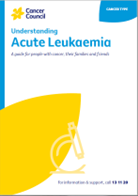- Home
- Acute lymphoblastic leukaemia (ALL)
- Diagnosis
ALL diagnosis
If you have symptoms of acute leukaemia, or if you have a test for another reason and it suggests acute leukaemia, your general practitioner (GP) will do a physical examination, organise further tests and may refer you to a specialist called a haematologist.
Learn more about:
Overview
The main tests to work out whether you have acute lymphoblastic leukaemia (ALL) are blood and bone marrow tests. You may have other tests such as a CT scan or ultrasound to confirm the diagnosis.
After an ALL diagnosis, you are likely to see a range of health professionals, who will all play a part in your treatment.
Many people feel understandably shocked and upset when told they have ALL. If you need support, call Cancer Council 13 11 20.
Podcast: Tests and Cancer
Listen to more of our podcast for people affected by cancer
More resources
Dr Jonathan Sillar, Haematologist, Calvary Mater Newcastle Hospital; Dr Scott Dunkley, Haematologist, Royal Prince Alfred Hospital and Chris O’Brien Lifehouse; Sharon Frazer, Consumer; Dr Robin Gasiorowski, Staff Specialist, Haematology, Concord Hospital; Prof Angela Hong, Radiation Oncologist, Chris O’Brien Lifehouse, and Clinical Professor, The University of Sydney; Yvonne King, 13 11 20 Consultant, Cancer Council NSW; Heather Mackay, Clinical Nurse Consultant – Haematology, Westmead Hospital; Katelin Mayer, Clinical Nurse Consultant, Cancer Outreach Team, Nelune Comprehensive Cancer Centre.
View the Cancer Council NSW editorial policy.
View all publications or call 13 11 20 for free printed copies.

